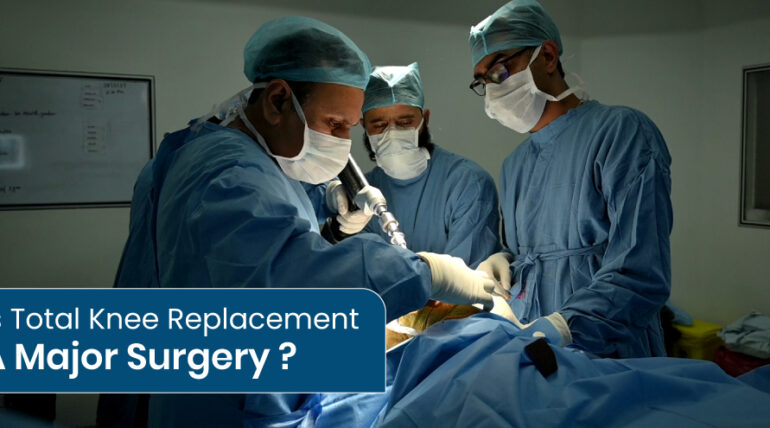
Total Knee Replacement (TKR) or total knee arthroplasty is perhaps one of the best known, and most commonly performed operations in orthopedic surgery. And still, people ask: Is total knee replacement major surgery?
The answer is yes, and yes is usually the answer to the surgery question without going into the details, But the What, Why, And How of it, helps patients form reasonable answers to their treatment choices.
What do Surgeons do in a total knee replacement?
In total knee replacement surgery the knee joint (cartilage and bone) is other parts are cut out in knee replacement surgery and artificial joints are put in place of bone, metal, plastic, or ceramic. Pain relief, knee movement restoration and quality of life changes is the end goal.
The procedure typically involves:
- General or regional anesthesia
- Incision over the knee
- Damaged tissue and bone removal
- Prosthetic components insertion
- Suture application and recovery
The surgery can take anywhere between 1 to 3 hours depending on the severity of the damage and the patient’s overall health.
Why Is Total Knee Replacement Considered Major Surgery?
Several variables contribute to considering TKR as major surgery:
1. Involves Deep Structures:- Tissues such as bones, cartilage, ligaments and muscles are deep structures, which are a part of TKR. Unlike simple surgeries that deal with surface level tissues, TKR requires intricate bone, muscle and cartilage work. An orthopedic surgeon has to replace damaged structures which require precise work within the knee joint.
2. Significant Recovery Period:- Recovery after total knee replacement is diverse and intensive, ranging from several weeks to months. Patients require physical therapy, frequent follow-ups, and steep lifestyle changes to help them regain mobility, strength and movement. The fact that they require a well-defined rehabilitation program further adds to the need for it to be considered major surgery.
3. Risks of Complications:- Like all major surgeries, TKR has risks of infection, blood clotting, negative reactions to anesthesia, failure of prosthesis, nerve damage and other issues. Even if modern medical technology and surgical techniques have reduced such risks greatly, the chances still exist and have to be managed carefully.
4. Requires Hospitalization:- Hospitalization periods for most patients range between 2 to 5 days, but can extend beyond that in certain cases. Monitoring and managing pain, helping with mobility, and attending to the surgery site immediately after the operation are very important.
5. Impact on Overall Health
As knee replacement surgery affects movement and mobility, which are fundamental to day-to-day operations, the importance of its impact on health is very high. Most patients undergo extensive troubleshooting evaluations which could range from heart checks and blood tests to dental clearances as a minimal risk safety measure before surgery.
Benefits of Total Knee Replacement
- Tremendous pain relief from chronic osteoarthritis or rheumatoid arthritis,
- Major improvement in mobility, and ability to perform everyday tasks
- Boost in life quality and freedom
- Deformity correction, replacing bowlegs or knock knees.
Substantial advancements in medicine have also made the surgery relatively problem free. Now, due to minimally invasive strategies and advanced prosthetics, many patients report better recuperation and overall health results.
How to Prepare for Total Knee Replacement?
These preparations can lead to a better surgical experience and recovery. These are critical steps, including:
Post-op rehabilitation—strategic strengthening of knee-supporting muscles ache,
Surgical Weight Management—sustained weight loss reduces stress on the new joint.
Home Prep—installing handrails, securing loose carpets, and arranging for help at home post surgery.
Discussing complications with your surgeon needs to be done before canceling other medication.
Every individual has unique needs and tailoring an all-encompassing pre-surgical plan per patient is essential to greatly heighten surgery results.
Life After Having A Knee Replacement Surgery
Most patients are able to resume normal activities like work, school, or even going out with friends in three to six months, although some will require up to a year for their recovery to be considered complete. While running and jumping should be avoided, swimming, cycling, walking, and even golf are encouraged.
Patients have claimed that their one regret is waiting so long to get the operation done after noticing how much their quality of life has skyrocketed.
Final Thoughts
Although a total knee replacement is a considerably intense surgical procedure, the success rate of this surgery is notably high when done by skilled surgeons. With proper instructions, preparation, and commitment to freaking work like a dog to rehab, patients suffering from the crippling agony of advanced arthritis or knee injuries will be able to enjoy life without constant pain-thanking the procedure.
If you are considering knee replacement, consulting a trusted and experienced surgeon is crucial.
Dr. Neeraj Yadav is a distinguished Orthopedic and Joint Replacement Surgeon with over 15 years of experience. His expertise spans bone disorders, hip and knee replacements, AO trauma, and complex joint reconstructions.
With a commitment to excellence, compassion, and patient-centric care, Dr. Neeraj Yadav is the right choice to guide you through your journey toward better mobility and a pain-free life.
